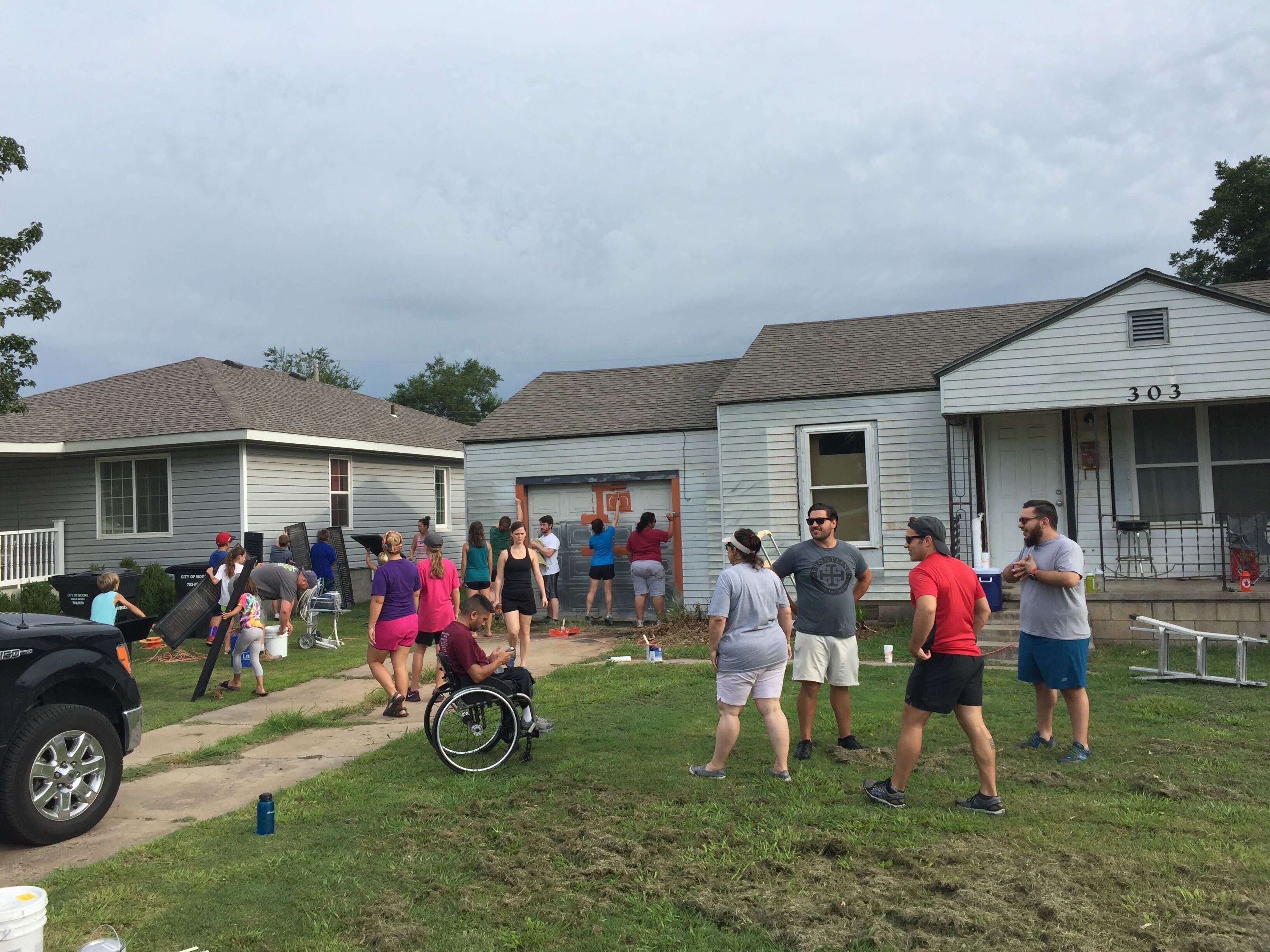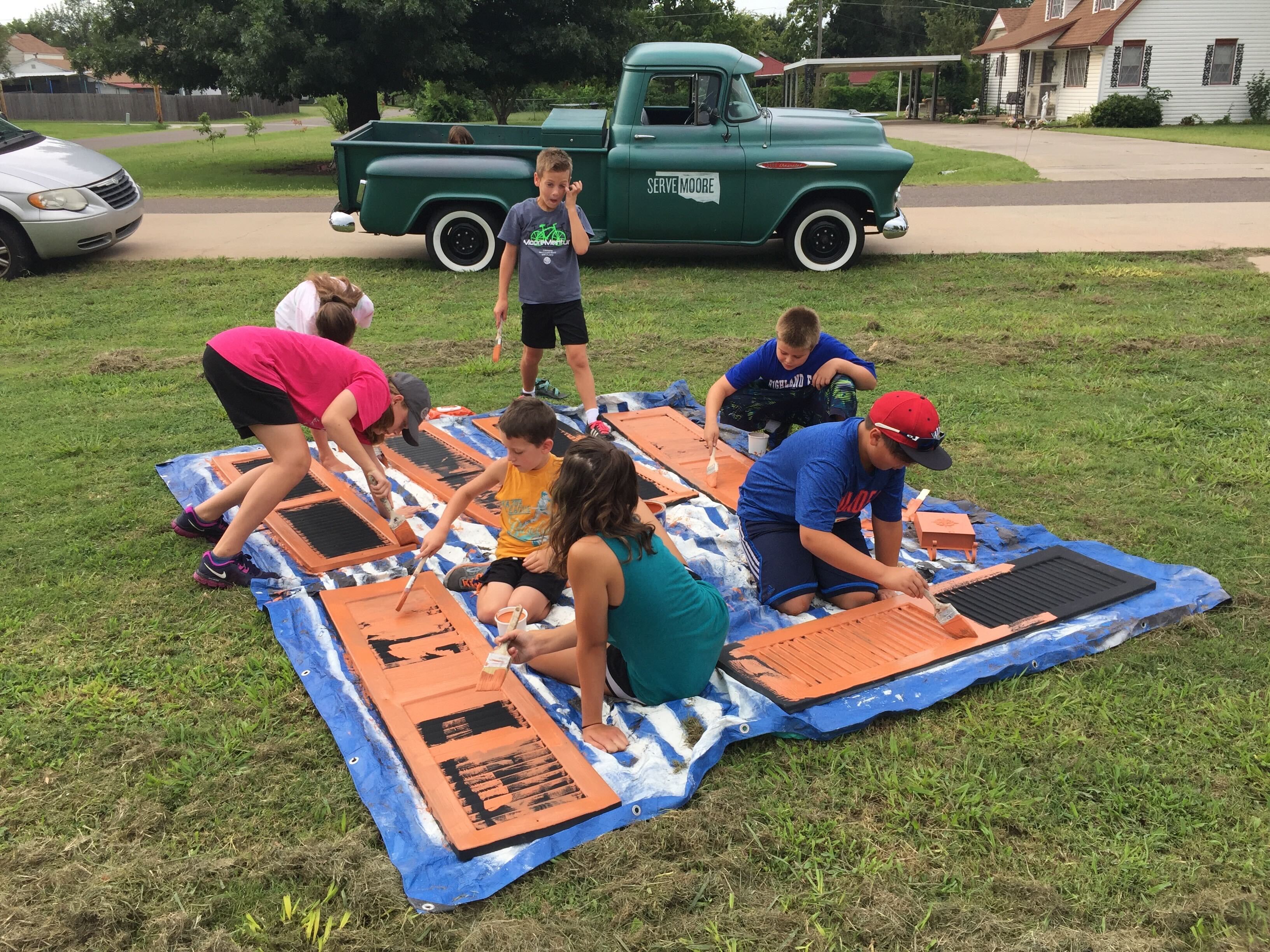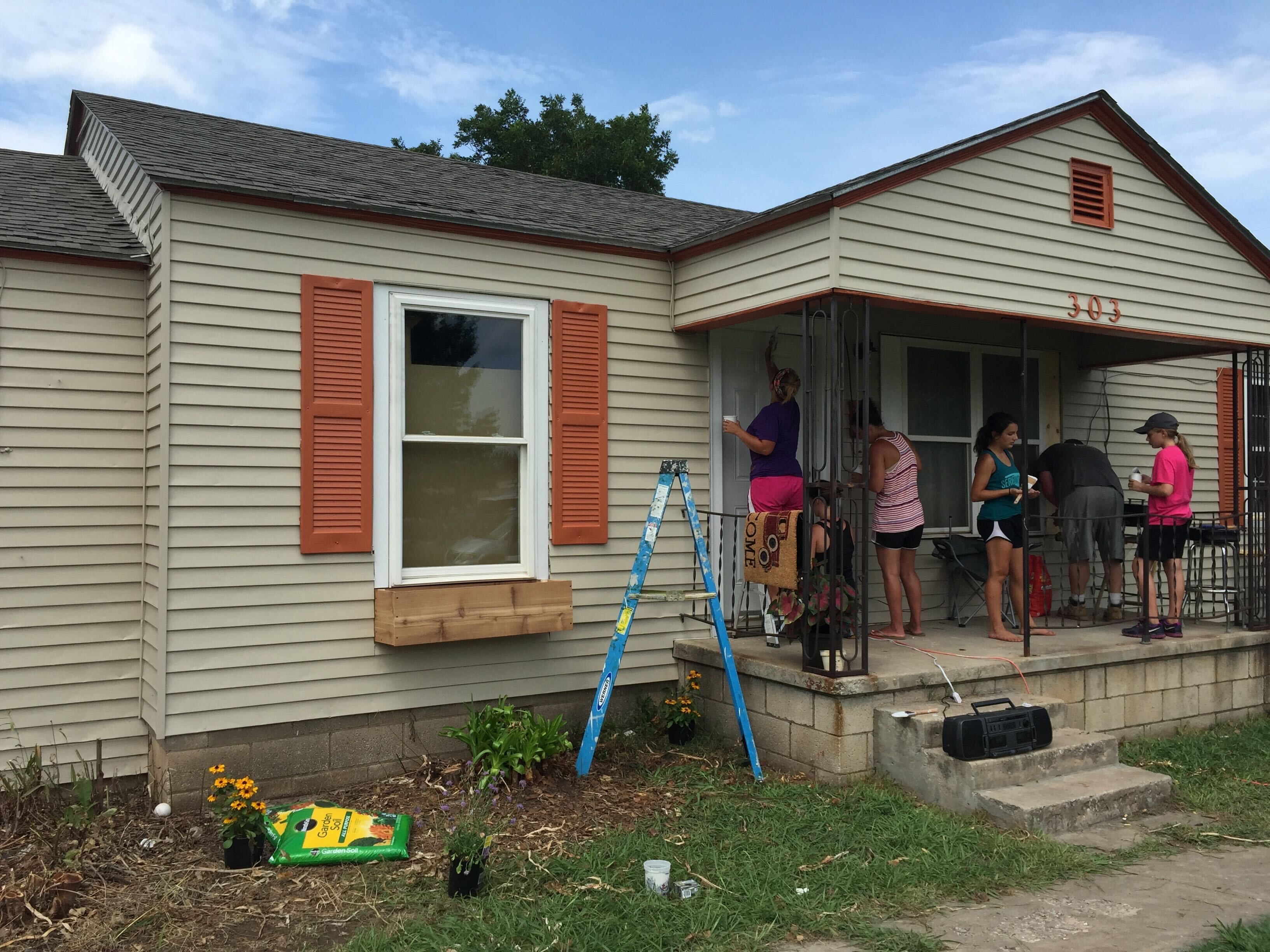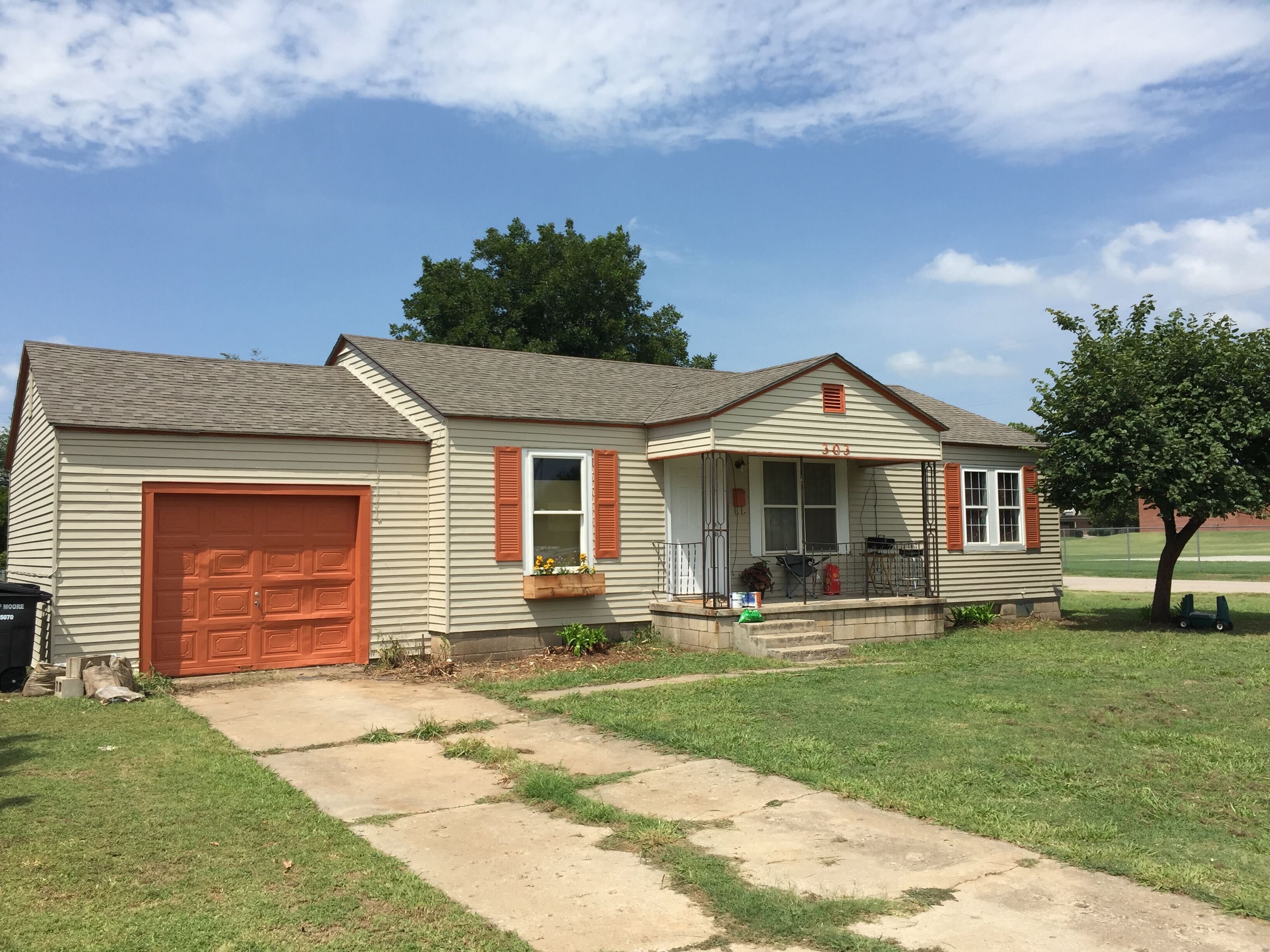
Push Back Darkness Grant Origin Story
Written by Sean Evans, Frontline South Executive Pastor
Like any good idea I've ever been involved with in ministry, Push Back Darkness Grants didn't come from anywhere inside my mind. Usually, God has to flash the light bulb a few times before it ever comes on. The origin of the Push Back Darkness Grant was a complete accident (to me, at least.) My community group was thinking about how we might take more missional ground in our neighborhood, and our progress was earnest but slow.
In the late summer of 2014, we noticed a house at the end of the block that was spiraling further toward complete disrepair. The grass (read: weeds) was tall eight months of the year, a house number or two was missing above the garage, and whatever paint was left on the house was decaying rapidly. If I'm honest, I was more annoyed than I was compelled. "Why don't those homeowners just take care of what they have and stop making the rest of us look bad? How hard is it to take an hour on Saturday and cut the yard?" Maybe your thoughts have drifted this way before. My mind had drifted this way several times throughout the last year with this particular house. Then we met Donna, the owner.
One summer afternoon, my boys had kicked a soccer ball into her backyard and weren't ready to challenge whatever dogs lived inside the fence. We walked down and knocked on the faded front door together. A woman with graying hair appeared, wearing a tired look. She quickly replaced it with a shy smile as I introduced myself and my sons. "I'm Donna. I've lived here a few years now, but you probably don't see me much because of my crazy work schedule." She retrieved the soccer ball, and as the boys ran off, we stood on her porch for a few minutes chatting.
I learned Donna had lived alone until recently when her son deployed, and she took on caring for her grandson. It meant working extra shifts as a nurse to bring in additional income. It meant not being home as much as she cared for her grandson, paying for his childcare, and managing her son's apartment. It meant the grass at the end of my block was longer than I liked. My heart softened. I left her porch that day with my burdens against her replaced by burdens for her. I no longer wondered why “that person” wasn't caring for their property. Instead, I wondered how my family and friends might help care for her. My words felt empty as I pointed to my home and told her to let us know if she ever needed anything.
In the days that followed, we had more chances to say hello. We waved as she came and went on her way, or we went on ours. One of my neighbors in our community group started mowing her grass on the days he mowed his own. Another ensured her trash made it to the curb on overnight work shifts. We invited her to a backyard BBQ, but she was working. She worked a lot. We brainstormed and then took a risk. "Donna, you sure are working a lot, and we're wondering if there are things we can help with around the house that could help relieve you?"
Expectedly, she declined and dismissed the idea quickly.
“No, really, we see how much you're sacrificing for your own family and want to practice being good neighbors to you. Some of us have been looking for ways to be more active in knowing our neighbors, and we feel it's something God has put on our hearts to help you however we can.”
Her eyes welled up a little, and she slowly moved toward the house. "I wish I could take better care of this place, but I feel overwhelmed with where to start.” That settled it.
We planned to make a few repairs: trim a few bushes and pull weeds from the flower beds. As we talked and prayed as a group, the idea just grew. We couldn't help but be excited to do more than we'd offered Donna. We borrowed some tools from a local nonprofit. Someone had a friend with a paint sprayer and tools to scrape the old paint. Before Donna knew, we all pitched in to buy what was needed to repair and repaint the little house. Like a normal Saturday, she worked a double shift at the hospital. We told her we'd be working outside for a while, and she put the dogs in the garage and left with a quiet, "Thank you so much." With much excitement, we got to work early that morning. Kids pulled weeds while adults trimmed shrubs and scraped paint. The new paint and accent color went on. The new house numbers went up. It looked great, but we encountered a surprise, as you sometimes do with home repairs.

Our hearts sank as we noticed a hole the size of a small child in the front of the home's siding, which an overgrown bush had covered. Nothing kept the outside elements from coming directly into the home. We couldn't leave it this way, but it would surely cost a few hundred dollars beyond what our small community group had already raised. Here we were, doing our best to serve a single grandmother, working constantly to make ends meet for her and her grandson while her son was on military deployment. Had we just made the problem worse by exposing it even more? Would she now feel the embarrassment of a hole in her house facing the street for everyone passing by to see? If only there were an option to help our group serve the people in need in our city. The light flickered.
Our church cares about our city and those hurting and in need—shouldn't our community groups do the same? The light bulb went on and off again. We give generously as a church on Christmas Eve to Frontline's Global Compassion Offering so people like Donna can be cared for and encounter the love of God through His people. There it is. The light bulb stayed on this time. Why couldn't some of those funds go toward helping us finish this project to bless our neighbor? A couple of phone calls later, the response was clear. Yes, we need to use Compassion funds to help this community group follow through on loving their neighbor. But there was more to think about. How do we offer a similar opportunity to all Frontline community groups? How can we say to our people on Christmas Eve, "Give generously so those in need might be served, and then go and be the hands and feet of Jesus that carries out that mission?" Now, a few years and a few hundred Push Back Darkness Grants later, we've seen beautiful things happen across our communities. Many of our neighbors and coworkers have experienced God's love through His people's generosity.

Our church cares about our city and those hurting and in need—shouldn't our community groups do the same?
That day, we thought we had a surprise for Donna, but as it turns out, the biggest surprise was for us. Early that evening, a few of us sat on my porch and waited for her to return home to see her "new" house. A car I didn't recognize piqued my interest as it crept by at a slow pace. A young man stepped out of the passenger side, opened the back seat, grabbed a couple of bags, and stood motionless in the street. He stared at Donna's house and then looked behind him at the house across the street. He looked left and right, confused and unconvinced, before he concluded he could leave his spot. What happened next was the part none of us could have dreamed up. Donna's car pulled into the driveway while he stood looking at her house. They moved toward one another in one of those long embraces you have when you see a family member for the first time in a while. Together, they turned to look at the house, and I could hear laughter and tears shared from two doors down. Donna's son was home, and there was much for them to celebrate. There was much for us to celebrate that night, too. We opened our hearts to a neighbor. We opened our hands, a little of our bank accounts, and God showed us a little piece of his Kingdom breaking into our neighborhood.
Since this inaugural Push Back Darkness Grant, we have been able to support 182 other efforts to push back darkness in our cities through grants. As a church, I believe we've only scratched the surface of what we'll be able to accomplish together in the coming years through Push Back Darkness Grants for the glory of God and the good of our city.
If you have an idea of a way for your community group to alleviate pain and suffering in your neighborhood, visit frontlinechurch.com/grants to learn how to apply.

This year, Frontline Church is celebrating our 20th Anniversary! On Easter Sunday 2005, Frontline was planted in Josh & Nancy Kouri's living room. 20 years later, we are one church with five congregations across Central Oklahoma committed to loving God, loving people, and pushing back darkness. To read more stories like this one or learn how you can celebrate with us, visit frontlinechurch.com/20year.